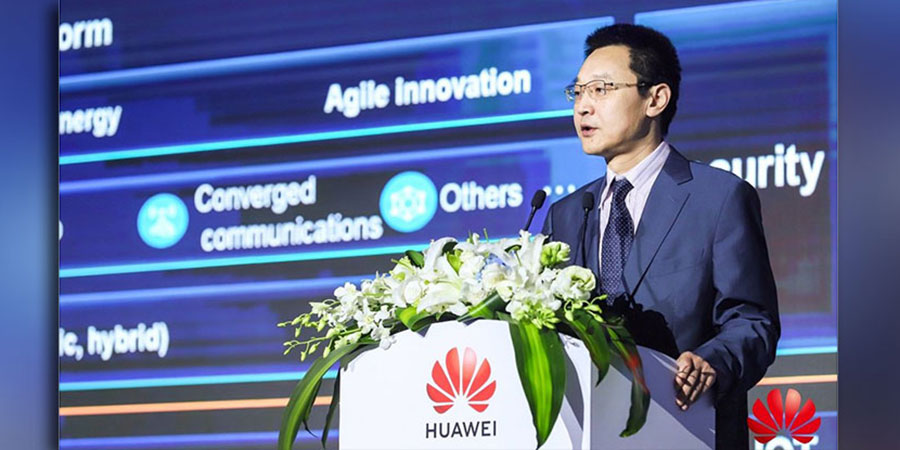Huawei held their Global FSI Summit 2019 with its partners I Shanghai, China on Thursday where industry key players discussed the latest developments in FinTech.
The theme of the summit was “Holistic Digital Transformation, Taking the Pulse of Smart Finance” and it had more than 2,000 customers from major global institutions such as the likes of Deloitte, China Life Insurance, the Industrial and Commercial Bank of China, Bradesco, Erste Bank, Sberbank. Shenzhen Stock exchange, Guotai Junan Securities, and Zheijang rural Credit.
The Huawei Global FSI Summit 2019 was centered on the financial services industry and the new challenges it is currently facing in this digital economy era. The attendees shared their initiatives and ideas with regards to digital transformation and suggested some of their own successful practices in order to help financial institutions navigate in the fast-growing smart finance industry.
In an opening speech, VP of Huawei Enterprise BG and the President of EBG Global Sales, Ma Yue stated:
“The financial services industry has entered the 4.0 era. Financial services are becoming everywhere, driving the financial institutions to build platforms and ecosystems to allow the creation of new business and service models. AI and data have become core driving forces that enable financial business innovation. Huawei’s AI + Data Solution helps customers reshape their closed ICT systems into open cloud platforms. This allows data to evolve to big data and fast data. We are helping customers build Ai platforms and achieve Smart Finance.”
For the event Huawei and its partners held it in a smart exhibition hall where all the research areas and topics of discussion showcased the latest intelligent financial solutions which offered scenario specific service experiences.
The list of scenario-specific services included: Smart Experience, Smart decision-making, Smart Architecture, and Fundamental Research.
Deloitte Asia’s FSI Leader, Tim Pagett, commented on these issues at the conference and said that the changes coming into the industry are picking up at a very rapid pace.
“Change steps have shifted from linear to rapid pickup. Structured and unstructured data is expanding rapidly. It’s crucial to obtain, visualize, and integrate big data to make major business decisions.”
He added, “At the same time, demographic changes and digital enterprises have reshaped the market environment. The trend is to provide customers with smooth digital experience. Therefore, technology, talent, and business culture will all become flexible and agile.”
Smart banking is becoming an essential part of the digital economy era.
ICBC’s Deputy General Manager of Technology, Zhang Yan, stated that ICBC promotes the in-depth integration of banking ecosystems and reshapes the business’ architecture of “all-customers, omni-channels, and all-products” to a new and more advanced ecosystem which resembles the dual-core IT architecture of the “host + open platform”. According to Yan, this is done in order to promote the smart, open and inclusive transformation of the financial industry and its services and to build an ecosystem which ensures efficient integration between finance and technology.
Executive Assistant of the BOD at Erste Bank, Clemens Muller, stated: “Innovation is deeply embedded in Erste’s DNA and is one of the core business drivers within Erste Bank. Erste has proven already in the area of trade financing and in retail banking that it’s capable to build technology-enabled FinTech like solutions from scratch.”
Deputy General Manager of the Data Department at China Life Insurance, Lin Zhipeng, said that the company built a digital platform through leveraging cloud IT architecture and AI.
“Based on this, we can build a digital business platform that integrates healthcare, elderly care, and financial services with the insurance core. It offers smart insurance services to support social and economic development and improve people’s lives.”
Shenzhen Stock Exchange’s Chief Engineer, Yu Huali, spoke about how they have accelerated the company’s transformation of the technical architecture through the use of a combination of networking, intelligence and digitalization as the core elements within their financial environment.
In reference to Huawei’s “AI + data”, Huali said, “Data and AI optimize risk control, improve service capabilities of trading platforms, and promote the healthy development of the securities trading market.”
Huawei and its partners collaborated to provide connectivity and intelligence to help the ICT industry integrate into the digital platform “AI + data” which is aimed at helping both enterprise customers and government entities to navigate their way to digital transformation.
Over 700 cities worldwide and 211 Fortune Global companies have chosen Huawei to be their partner in digital transformation. Huawei has also worked with over 1000 financial institutions, some of which included 20 of the top 50 banks globally.





